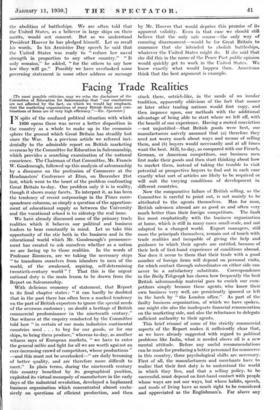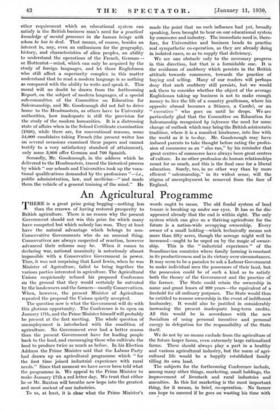Facing Trade Realities
[To meet possible criticism may we echo the disclaimer of the Committee of Education for Salesmanship that " our conclusions are not affected by the fact, on- which we would lay emphasis, that the marketing organizations of many British firms and com- binations of firms are of very high efficiency."--En. Spectator.] IN spite of the confused political situation with which 1930 opens there was never a better disposition in the country as a whole to make up in the economic sphere the ground which Great Britain has steadily lost since the War. In a previous article we referred inci dentally to the admirable report on British marketing overseas by the Committee for Education in Salesmanship, which provides a searching examination of the national conscience. The Chairman of that Committee, Mr. Francis W. Goodenough, followed up this analysis of salesmanship by a discourse on the profession of Commerce at the Headmasters' Conference at Eton, on December 21st last, which went to the heart of the problem confronting Great Britain to-day. One problem only it is in reality, though it shows many facets. To interpret it, as has been the tendency of recent outpourings in the Times corre- spondence columns, as simply a question of the apportion- ment of educational supply as between the University and the vocational school is to sidestep the real issue. We have already discussed some of the primary trae.,3 realities which it behoves our political and business leaders to bear constantly in mind. Let us take this opportunity of the stir both in the business and in the educational world which Mr. Goodenough's pronounce- ment has created to ask ourselves whether as a nation we are facing up to those realities. In the words of Professor Zimmern, are we taking the necessary steps " to transform ourselves from islanders to men of the world, of the awakened, aspiring, self-determining twentieth-century world " ? That this is the urgent national duty is the main lesson to be drawn from the Report on Salesmanship.
With delicious economy of statement, that Report In its- final chapter states : " it can hardly be doubted that in the past there has often been a marked tendency on the part of British exporters to ignore the special needs of the overseas customer ; no doubt a heritage of British commercial predominance i n the nineteenth century." One witness at the enquiry conducted by the Committee told how " in certain of our main industries continental countries used . . . to beg for our goods, or for our ships, to bring them produce," whereas to-day, as another witness says of European markets, " we have to enter the general melie and fight for all we are worth against an ever-increasing crowd of competitors, whose productions '' and this must not be overlooked—" are daily becoming of better quality, and are therefore more difficult to meet" In plain terms, during the nineteenth century this country benefited by its geographical position, exploited its virtual monopoly of manufacture in the early days of the industrial revolution, developed a haphazard business organization which concentrated alniost exclu- sively on questions of efficient production, and then stuck there, ostrich-like, in the sands of an insular tradition, apparently oblivious of the fact that sooner or later other trading nations would first copy, and then improve upon, our methods with the additional advantage of being able to start where we left off, with the benefit of our experience. Having a rooted conviction —not unjustified—that British goods were best, our manufacturers -naively assumed that (a) therefore they need not worry much about ways and means of selling them, and (b) buyers would necessarily and at all times want the best. Still, to-day, as compared with our French, German, or American competitors, our business men first make their goods and then start thinking about how to market them, instead of taking the trouble to visit potential or prospective buyers to find out in each case exactly what sort of articles are likely to be required or will suit the varying conditions of development in different countries.
Now the comparative failure of British selling, as the Committee is careful to point out, is not mainly to be attributed to the agents themselves. Man for man, British salesmen abroad are as good as and often very much better than their foreign competitors. The fault lies most emphatically with the business organization at home, which is still in many cases small-scale, and not adapted to a changed world. Export managers, still more the principals themselves, remain out of touch with trade realities and incapable of giving the help and guidance to which _their agents are entitled, because of their lack of first-hand experience of conditions abroad. Nor does it occur to them that their trade with a good number of foreign firms will depend on personal visits, for which contact through subordinates on either side can never be a satisfactory substitute. Correspondence in the Daily Telegraph has shown how frequently the best British salesmanship material goes to enrich our com- petitors simply because these agents, who know their own business very well, are persistently, ignored or left in the lurch by " the London office." As part of the faulty business organization, of which we have spoken, one might cite also the inadequate financial remuneration on the marketing side, and also the reluctance to delegate sufficient authority to their agents.
This brief résumé of some of the strictly commercial aspects of the Report makes it sufficiently clear that, as we have already suggested with regard to political problems like India, what is needed above all is a new mental attitude.. Before any useful recommendations can be made for producing a better personnel for commerce in this country, three psychological shifts are necessary. First of all, the manufacturers and merchants have to realize that their first duty is to understand the world in which they live, and that a selling policy, to be successful, must depend on first-hand contact with people whose wayi are not our ways, but whose habits, speech, and mode of living have as much right to be considered. and appreciated as the Englishman's. Far above any other requirement which an educational system can satisfy is the British business man's need for a practical knowledge of mental processes in the human beings with whom he has to deal. That means, of course, besides an interest in, nay, even an enthusiasm for the geography, history, and characteristics of alien peoples, an ability to understand the operations of the French, German— or Hottentot—mind, which can only be acquired by the study of foreign languages, and let those Englishmen who still affect a superiority complex in this matter understand that to read a modern language is as nothing as compared with the ability to write and speak it. This moral will no doubt be drawn from the forthcoming Report, on the subject of modem languages, of a special sub-committee of the Committee on Education for Salesmanship, and Mr. Goodenough did not fail to drive home to the Headmasters, as others have to University authorities, how inadequate.- is still the provision for the study of the modern humanities. It is a distressing state of affairs when in the School Certificate examination (1928), while there are, for conventional reasons, some 54,000 candidates taking French (the present writer has on several occasions examined these papers and cannot testify to a very satisfactory standard of attainment), only some 3,800 offer German and 700 Spanish.
Secondly, Mr. Goodenough, in the address which he delivered to the Headmasters, traced the historical process by which " our schools and Universities took up the voca- tional qualifications demanded by the professions "—i.e., public administration, law, and medicine—" and made them the vehicle of a general training of the mind." He made the point that no such influence had yet, broadly speaking, been brought to bear on our educational system by commerce and industry. The immediate need is, there- fore, for Universities and business heads to practise real sympathetic co-operation, as they are already doing in isolated cases, so as to supply that deficiency.
We see one obstacle only to the necessary progress in this direction, but that is a formidable one. It is the residuum of snobbery which persists in the British attitude towards commerce, towards the practice of buying and selling. Many of our readers will perhaps deny that such snobbery still persists, but we would ask them to consider whether the object of the average Englishman taking up business is not to make enough money to live the life of a country gentleman, where his opposite abroad becomes a Stinnes, a Camb6, or an " executive " who goes on until he drops. We are particularly glad that the Committee on Education for Salesmanship recognized by inference the need for some change of outlook which may bring the British aristocratic tradition, where it is a manifest hindrance, into line with the world as it is to-day. Mr. Goodenough may have induced parents to take thought before rating the profes- sion of commerce as an " also ran," by his reminder that great centres of commerce have always been great centres of culture. In no other profession do human relationships count for so much, and this is the final case for a. liberal education. Surely, too, in no other way than by more efficient " salesmanship," in its widest sense, will the stigma of unemployment be removed from the face of England,







































 Previous page
Previous page